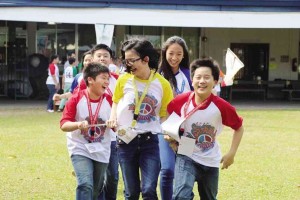Two varsity basketball players were playing one-on-one as guards, parents, fetchers and students from various schools watched.
A block went wrong and a player slid to the floor. “Foul!” he yelled, as the other scoffed, “Get on with the game!” Tension built. “You don’t belong in this team!”
Bystanders tried to look away. Curses flew. The ball slammed into the barricade. Some girls shouted, “Stop it!” Guards reached for their radios. Everyone knew a fistfight was imminent.
Suddenly, someone ran onto the court and got between the two players, like a referee trying to hold apart two raging boxers.
Student facilitators emerged from their hiding spot in the bleachers clapping their hands. The players stopped fighting, joined in the applause and patted the intrepid peacemaker on the back.
“Congratulations! Your team receives full points for this station.” Students and spectators listened open-mouthed as facilitators explained that the fight was staged to test their reactions to a real-life conflict.
The peacemaker was no ordinary student. He was a leader and a participant of the 14th Edsor Peace Camp.
Consortium
Edsor, or the Edsa-Ortigas Consortium of Schools, composed of Immaculate Conception Academy (ICA), La Salle Green Hills, Saint Pedro Poveda College and Xavier School, was founded in 1986 after the Edsa People Power Revolution.
The first Edsor Peace Camp was held in 2000 to keep the spirit of people power alive in the youth.
Each year’s theme is determined by the host school—Poveda focused on bayanihan; ICA, empowerment, and La Salle, antibullying.
This year was Xavier’s turn. For two days last month, the school opened its gates to 200 middle and high school student leaders from the four schools for “Edsor Engage: Dialogues for Peace.” Participants formed teams with names like Pyong Hwa, Kapayapaan and Shalom, all of which translate to peace.
“The opposite of peace is violence,” said keynote speaker Aryameir Bagis Ismael, director of Ateneo de Zamboanga Peace and Culture Institute, over Skype. “And violence is a learned trait.”
If violence is learned, can it be unlearned? Can peace be learned, too?
In the Edsor Peace Camp, participants realized that inner peace started with knowing who they were. Guided by mentors, they discovered that shared traits, like race, social status,
religion or nationality, could bring people together or split communities apart.
Participants explored their social identities because, as one Xaverian quipped, “You’ll get offended when someone points out your chinky eyes if you don’t want to admit you’re Asian.”
Believing experience was the best teacher, teams set out with gusto for the “Amazing Race,” a series of games designed to nurture skills needed by peacemakers.
Student coordinators watched participants tackle challenges and learn from each other’s leadership styles. Xaverians leapt into action based on gut feel as they decisively resolved the staged fights. In volleyball, the La Sallians kept everyone’s energy up, bouncing the ball over the net.
Voices rose as broken, leaky cups were passed from person to person to fill a bucket with water, but Povedans kept the teams calm. Navigating a dark room with an empty flashlight or only batteries? ICAns led the negotiations that taught everyone the value of compromise.
The Face to Faith program, run by Tony Blair Foundation, used video technology to connect students of all cultures, religions, nations in discussions on environment, human rights and, of course, peace.
Much like the Disney online multiplayer game “Club Penguin,” swearing and fighting could get one banned. In Face to Faith, participants learned at the peace camp that respectful, peaceful and open dialogue was key.
Participants linked up with students from Indonesia, Singapore and India.
“Everyone is equal,” an ICAn said. “Peace starts with us,” a Xaverian said. “As much as we want peace for the world, we must first resolve our own conflicts.” A student from Laxman Public School in India offered the tip, “Yoga is a very good way to calm the mind.”
Conversations were freewheeling yet disciplined, responses well-crafted yet spontaneous.
Discussions flowed from cyberterrorism to family, from the media’s effect on violence to the freedom of religion in Islam and Catholic schools.
“Today we learn, tomorrow we teach, taking pride in what we preach,” went the Edsor song. “The problems of yesterday fade away, as we march into a new day.”
Scott Lee Chua, a Xavier School sophomore, is a member of the Edsor Committee. E-mail the author at slchua16@xs.edu.ph.



